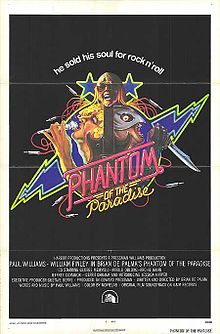 This early effort by Brian DePalma shows a unique side of this controversial auteur, who’s become known in the decades since as a specialist in horror-suspense. PHANTOM OF THE PARADISE, by contrast, is a musical satire, and an extremely good one.
This early effort by Brian DePalma shows a unique side of this controversial auteur, who’s become known in the decades since as a specialist in horror-suspense. PHANTOM OF THE PARADISE, by contrast, is a musical satire, and an extremely good one.
PHANTOM OF THE PARADISE, a jokey PHANTOM OF THE OPERA redo set in the music world of the early seventies, was a trailblazer back in 1974, with its deliberately campy approach and wacky music numbers. It predated the better-known ROCKY HORROR PICTURE SHOW by a year and is in my view a far superior film. It’s certainly tailor-made for the sensibilities of its writer-director, and suggests that his career could have gone in an entirely different direction from the way it did. PHANTOM, after all, was made during the era of experimental DePalma pictures like HI MOM and GET TO KNOW YOUR RABBIT, when he had yet to fully commit to thriller moviemaking.
Nowadays PHANTOM OF THE PARADISE stands as an intriguing anomaly in DePalma’s filmography, and perhaps the ultimate movie about the glam rock era (being everything writer-director Todd Haynes was trying for in the misfired VELVET GOLDMINE). It’s currently on tap to be remade, but I believe any prospective redo will have a tough time recapturing the original film’s breezy outrageousness.
Winslow Leach is a struggling musician looking for recognition from the shadowy record tycoon Swan. Swan recognizes Winslow’s talent, all right…by stealing his compositions and taking credit for them! Winslow does his damndest to get a meeting with Swan, and literally goes mad in the process, ending up beaten, arrested, framed and severely injured in a record press. Winslow survives, though, donning a black cape and silver bird mask, in which guise he terrorizes a trendy nightclub Swan owns called the Paradise.
Swan catches onto Winslow’s game and decides to make a deal with him. He presents Winslow with a contract the latter unwittingly signs in blood, stipulating that he’ll ghostwrite Swan’s music until he dies. Unfortunately Winslow doesn’t realize the full significance of this contract until it’s too late.
In the meantime things seem okay. Winslow personally selects the pretty young Phoenix, with whom he’s hopelessly smitten, as the star of one of Swan’s musical numbers. But Swan ruins this by seducing Phoenix and making her his sex slave.
At the end of his rope, Winslow stumbles onto a reel of tape showing Swan making a pact with the Devil, handing over his immortal soul in exchange for immortality. The only thing that can do Swan in is the very tape Winslow is now viewing, which if burned will cause Swan’s immediate death—and very likely Winslow’s as well.
Brian DePalma’s visual approach has rarely ever seemed as fresh or inventive as it was in this film. The bold color scheme and distorted lenses are virtual anomalies in the DePalma universe, as is the wonderfully campy, oft-kilter sense of humor (a far cry from the “comedy” of alleged DePalma yuck fests like WISE GUYS and THE BONFIRE OF THE VANITIES).
But then again, much of the film showcases all the things—all the good things, anyway—we’ve come to expect from DePalma, most notably the stunningly imaginative visual sense and uniformly superb performances. All the actors here clearly understood the film’s exaggerated style, and perform accordingly; standouts include the diminutive Paul Williams, who also penned the rockin’ soundtrack, and a debuting Jessica Harper, who makes a sizeable impression in an underwritten role.
But it’s DePalma’s visuals that really shine. PHANTOM OF THE PARADISE may have been made early in its director’s career, but his visual sense was fully developed. There’s a split screen sequence pulled off with enough confidence and virtuosity to stand with those in any of DePalma’s later films; other delights include a music number whose performers use their instruments to skewer dummies and a wild climax featuring one of the most audacious pre-steadicam tracking shots you’ll ever see. Also worth noting is the sight of the Phantom, with his silver bird mask and glinting metal teeth. He’s a singular creation, at once goofy and freaky—as for the film overall, it’s both those things and a lot more.
Vital Statistics
PHANTOM OF THE PARADISE
Harbor Productions, Inc.
Director: Brian DePalma
Producer: Edward R. Pressman
Screenplay: Brian DePalma
Cinematography: Larry Pizer
Editing: Paul Hirsch
Cast: Paul Williams, William Finley, Jessica Harper, George Memmoli, Harold Oblong, Archie Hahn, Jaffrey Comanor, Gerrit Graham
